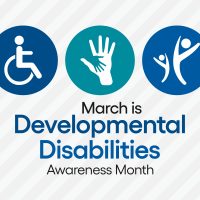March is Developmental Disability Awareness Month

In March of 1987, the Developmental Disabilities Awareness Month began, calling upon all Americans to provide the opportunities and encouragement necessary for people with developmental disabilities to reach their potential. Since then, the National Association of Councils on Developmental Disabilities (NACDD) holds a campaign each March to communicate the importance of inclusion and story sharing of individuals living with developmental disabilities (DD). The campaign emphasizes that people with DD can live fully in all areas of community life and help create more strong and diverse communities.
A developmental disability begins anytime during the developmental period, often in utero, and usually lasting throughout a person’s lifetime. The disabilities can be brought about by a complex set of factors, including genetics, parental behavior and health (i.e., smoking and drinking) during pregnancy, complications during birth, any infections present in the mother during pregnancy, and early life exposure to environmental toxins like lead. Some developmental disabilities directly correlate to pregnancy behaviors, such as fetal alcohol syndrome. However, most DD causes are not easy to decipher.
Developmental milestones are key to diagnosing when a DD may be present. Skills like a first smile, waving “bye-bye” and taking the first step, and other general developments like speaking, behaving, learning, playing, and body movement can indicate a need for closer monitoring if the child is not on an average timeline or behavioral spectrum. This observation is known as developmental monitoring and is a partnership between the parents and health care professionals that identify areas of concern.
Developmental disabilities appear before 22 years of age and are life-long, affecting one or both physical and cognitive functioning. If both intellectual and developmental disabilities (IDDs) are present at birth, and without proper intervention and support, it can negatively affect an individual’s emotional, intellectual, and physical development trajectory. The Centers for Disease Prevention and Control (CDC) funds the Study to Explore Early Development (SEED) in a multi-year, multi-diverse site study to identify risk factors for children experiencing autism spectrum disorder (ASD).
Developmental disabilities occur among all socioeconomic, racial, and ethnic groups. Recent estimates for the US show about one in 54 (about 18.5 percent) of children ages 3 to 17 have one or more DDs such as:
- Autism spectrum disorders
- Cerebral palsy
- Attention-deficit/hyperactivity disorder
- Learning or intellectual disabilities
- Hearing loss
- Vision impairment
- Other developmental delays
Another CDC program, Autism and Developmental Disabilities Monitoring (ADDM) tracks the number and characteristics of children with ASD, cerebral palsy, and intellectual disability in diverse US communities. The CDC does not study treatment or education programs for individuals with developmental disabilities nor provide direct services to people with DD or their families. However, the CDC does give a list of resources for people affected by developmental disabilities here.
In 2004 the passing of the Individuals with Disabilities Education Act (IDEA) mandating accountability, excellence, and equity in education for children with disabilities guarantees early intervention, special education, and services to transition high schoolers with DDs into adulthood. This IDEA opens a world of possibilities through the resolve of self-advocates and their supporters. Individuals with developmental disabilities need education, health care, and community programs for the same reasons anyone else does — to stay vital, well, active, and an integral part of the community.
Having a disability does not preclude a person from being healthy within their normal range, which is to be as well as possible and stay that way to lead full and active lives. To achieve this includes the need for tools and information to make healthy choices and prevent illness since children with DD commonly suffer additional health conditions such as gastrointestinal symptoms, eczema and skin allergies, asthma, and migraine headaches, to name a few.
The National Association of Councils on Developmental Disabilities (NACDD), partnering with the Association for University Centers on Disabilities (AUCD) and the National Disability Rights Network (NDRN), create a social media campaign for March. This campaign seeks to raise awareness about and the inclusion of those with DDs in all areas of community life and draw attention to the barriers those living with disabilities still face. The goal is to highlight how all people can come together to help those with disabilities form and maintain strong, diverse communities.
If you have a loved one with a disability, it’s important to have a proper estate plan that ensures your loved one is taken care of. At McDonald Law Firm, we help families with these important planning decisions and would be honored to discuss your particular situation and needs. Contact Andre O. McDonald, a knowledgeable Howard County, Montgomery County and District of Columbia estate planning, special-needs planning, veterans pension planning and Medicaid planning attorney, at (443) 741-1088; (301) 941-7809 or (202) 640-2133 to schedule a consultation today.
DISCLAIMER: THE INFORMATION POSTED ON THIS BLOG IS INTENDED FOR EDUCATIONAL PURPOSES ONLY AND IS NOT INTENDED TO CONVEY LEGAL OR TAX ADVICE.











